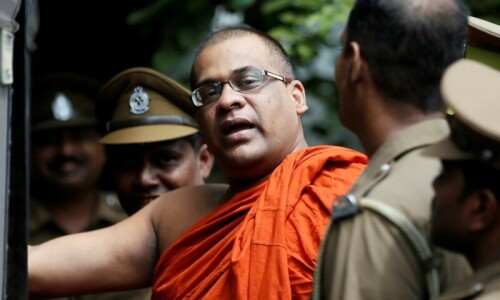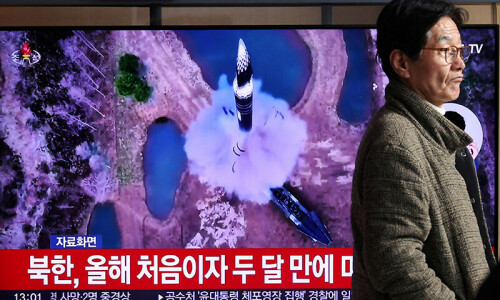LAST month, a close relative who had a severe stomach ache was admitted to a hospital in a posh Karachi area.
For two days, there was no proper diagnosis; she was put on a ventilator and the hospital billed for extraordinary charges. Nine days after the operation, she was sent home, where she developed complications.
The family took her to another well-known private hospital. Four days later she was sent for a magnetic resonance imaging (MRI) scan and the report was delivered a day later — only after relatives complained to higher authorities. The doctor found no problem but suggested that nephrologists be consulted immediately. He came two hours later, advising that the patient be shifted to the intensive care unit. While preparing to move her, the young doctor in the ward removed all her support systems, resulting in instant death.
Most Pakistanis, when they fall ill, consult private doctors or seek admittance in private hospitals. Most do this because the situation is worse in government hospitals. But at least the latter don’t fleece the patient’s families. In the above example, the total bill for 16 days’ stay in the two hospitals — without the charges for the surgery — was over Rs70,000 per day.
In developed countries, hospitals never charge in advance. In case of negligence, once proved, the patient or his/her kin are compensated. In Pakistan, advance payments have to be made to hospitals and even doctors. In case of any negligence, both go scot-free.
There is an urgent need to regulate private medical practices and hospitals in Pakistan. Since health has become a provincial subject after the passage of the 18th Amendment, each provincial legislature needs to pass a bill whereby all hospitals and doctors follow a minimum quality standard. To keep a check on them, the office of a health ombudsman should be established.
This can be headed by a High Court judge, with a senior doctor and an eminent citizen as members, constituting a forum where an appeal can be filed to review the quality of treatment. If the services did not meet the minimum standard, and/or it was a case of negligence by doctors, they should be liable to pay a penalty.
This would allow checks to be placed on private hospitals so that they strive to meet a minimum standard and remain alert about any malpractice by the doctors they employ. Those failing to do this can be penalised by the health ombudsman suspending their registration.
The quality of healthcare has also substantially deteriorated due to the mushrooming growth of medical colleges in the country, for these are producing poor doctors. Until 1983, Karachi had only two medical colleges. Then the government allowed the establishment of medical colleges in the private sector. Consequently, there are now 17 medical colleges. Anyone with Rs1-2m can get admission there.
Thus, a generation of non-deserving persons has been — or is — being churned out as doctors. After graduation, the brighter ones leave the country but they are allowed to practice only after passing an exam and going through over three years of rigorous training. Other medical graduates take CSS exams and join the customs, police and the civil service; a couple of the more talkative have been known to join private television channels as anchorpersons. The rest join private hospitals to make money. The least fortunate ones opt for jobs in the government’s health departments, working there during the day and practising in the evenings as GPs.
Under these circumstances, when their main interest is making money, how could our doctors be expected to save lives? When I asked a senior doctor for his comments, he responded that “everybody complains against doctors, but not against politicians, businessmen, lawyers and government officials.” In his view, doctors are part of society, so they should be allowed to do whatever they consider is best for them.
But can we turn a blind eye to a profession that has reached such a low standard? To stop the rot, besides regulating hospitals, a complete overhaul of medical education and training is needed. First, there is a need to change the requirement for admission into medical colleges, which has remained the same for over seven decades.
The knowledge base and the maturity levels of an FSc-level (12 years of education) student then was perhaps better than those with even 14 years of education now. Today, a teenager enters a medical college without a proper knowledge base and becomes a full-fledged physician by just attending lectures and seeing a few patients. By the time he or she graduates, they are hardly prepared to save anybody’s life.
The admission requirements must therefore be changed to 16 years of education in science, philosophy, humanities and the social sciences, as is the case in most other countries. By then, students will have acquired maturity and be in a position to decide whether they are fit to study medicine. After going through a rigorous course of study, including public health, they should be awarded the degree of Doctorate of Medicine. Furthermore, medical colleges should not be allowed to admit anyone without merit, such as through self-financing schemes and special quotas. Lastly, the Pakistan Medical and Dental Council, the watchdog of medical education which is known as a corrupt organisation: besides the principals of medical colleges, its panel should include public representation.
My recommendations may seem quite radical, but if we are unable to change the system, people will keep dying at the hands of poorly qualified doctors and their relatives will keep paying hefty bills to private hospitals.
The author is a professor of public policy in the US who previously worked in Karachi as a professor of reproductive health at a private medical university. mehtabkarim@gmail.com











































